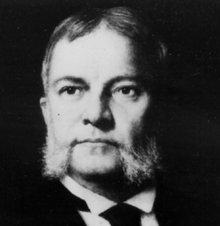Cornelius Newton Bliss
Cornelius Newton Bliss (born January 26, 1833 in Fall River , Bristol County , Massachusetts , † October 9, 1911 in New York City ) was an American politician ( Republican Party ) who served in the cabinet of US President William McKinley as Secretary of the Interior belonged to.
Bliss grew up in Massachusetts before moving to New Orleans , where he worked for his stepfather, who was in accounting there. After his return to Massachusetts in 1849, he first became an employee and later a junior partner of the Wright & Whitman trading house in Boston . Then his employer sent him to New York, where he should set up a branch. After the death of two senior partners the company was in Bliss, Fabyan & Co. renamed. Under this name it was one of the most successful wholesalers in the USA.
As a staunch advocate of protective tariffs , he was one of the founders of the American Protective Tariff League , which he also served as President for many years. Politically, he was active with the Republicans, whose chairman in New York he was from 1887 to 1888. He was a major contributor to Benjamin Harrison's success in the 1888 presidential election . From 1892 to 1904 he was Treasurer ( Treasurer ) of the Republican National Committee .
In the McKinley cabinet , Bliss was initially designated as Treasury Secretary in 1897 ; however, he refused. Instead, he took over the management of the Ministry of the Interior on March 6, 1897, which he headed until February 19, 1899. Before the presidential election in 1900 he was offered the post of Vice President ; this time too he renounced. In his place ran Theodore Roosevelt , who succeeded President McKinley after the attack.
Cornelius Newton Bliss was married to Elisabeth Mary Plummer (1836–1923). This marriage gave birth to four children, but two of them did not reach adulthood. His daughter Lillie was a co-founder of the Museum of Modern Art in New York.
Web links
- Cornelius Newton Bliss in the database of Find a Grave (English)
- Cornelius Newton Bliss in the Miller Center of Public Affairs of the University of Virginia (English)
- The Political Graveyard
| personal data | |
|---|---|
| SURNAME | Bliss, Cornelius Newton |
| BRIEF DESCRIPTION | American politician |
| DATE OF BIRTH | January 26, 1833 |
| PLACE OF BIRTH | Fall River , Massachusetts |
| DATE OF DEATH | October 9, 1911 |
| Place of death | New York City |

